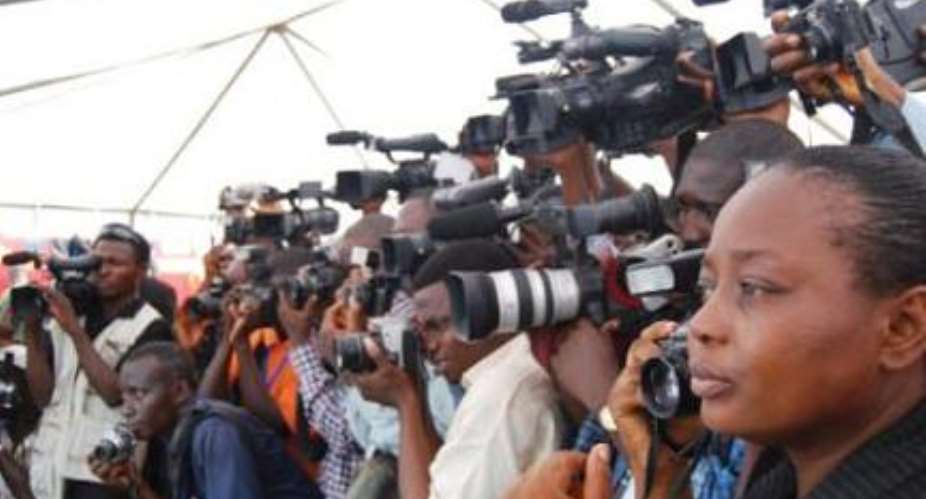Sunyani, May 29, GNA - Mr. Sebastian Junger, Founder of Reporters Instructed in Saving Colleagues (RISC), has stressed the need for journalists to be trained in life-saving techniques, to help save themselves and their colleagues, whilst working in dangerous areas.
RISC is a New York-based non-governmental organization which provides first aid training to journalists across the world.
Mr Junger made the call when he briefed 10 selected African journalists about the work of the organization at the New York Foreign Press Centre, as part of their recent press freedom and security tour in the United States of America (USA)
The tour was organised by the Washington Foreign Press Centre (FPC), and sponsored by the US Department of State.
He explained that RISC trains journalists, especially free-lance conflict journalists in life-saving techniques, to help them to treat their wounds and those of others around them while on assignments in unsafe zones.
Mr Junger emphasized that RISC provides first aid training to journalists, particularly freelance and photo journalists, working in both the print and broadcast media, to mitigate the many threats against their physical security while on the field.
He said freelance journalists comprised the vast majority of reporters on the frontlines of wars and other risky conflict zones around the world today, and consequently suffered most of the deaths and injuries.
'While staff reporters are often provided emergency medical training by their employers, most freelancers have not received any training before heading into a conflict zone' Mr. Junger noted, adding that 'Journalists often travel together in groups and lack of training puts their lives and many at risk.'
He said surviving a gunshot wound was often a matter of doing the right thing in the first few minutes, hence the RISC training was necessary and critical to ensure that the trainees left the course with the knowledge acquired from the training, as well as a comprehensive medical pack to carry with them in conflict zones.
Mr Junger said several prominent, dedicated war reporters had been killed in the past few years alone, saying the training therefore prevented unnecessary journalists' injuries and deaths in conflict zones.
It also allowed independent reporters to continue to bring reliable news to the rest of the world from dangerous territories, Mr. Junger said.
He hoped journalists and freelance reporters trained in first aid service would be able to treat not only their own wounds on the field, but also those of their colleagues, until they were able to access professional medical care.
GNA





 Lay KPMG audit report on SML-GRA contract before Parliament – Isaac Adongo tells...
Lay KPMG audit report on SML-GRA contract before Parliament – Isaac Adongo tells...
 Supervisor remanded for stabbing businessman with broken bottle and screwdriver
Supervisor remanded for stabbing businessman with broken bottle and screwdriver
 NDC watching EC and NPP closely on Returning Officer recruitment — Omane Boamah
NDC watching EC and NPP closely on Returning Officer recruitment — Omane Boamah
 Your decision to contest for president again is pathetic – Annoh-Dompreh blasts ...
Your decision to contest for president again is pathetic – Annoh-Dompreh blasts ...
 Election 2024: Security agencies ready to keep peace and secure the country — IG...
Election 2024: Security agencies ready to keep peace and secure the country — IG...
 People no longer place value in public basic schools; new uniforms, painting wil...
People no longer place value in public basic schools; new uniforms, painting wil...
 'Comedian' Paul Adom Otchere needs help – Sulemana Braimah
'Comedian' Paul Adom Otchere needs help – Sulemana Braimah
 Ejisu by-election: Only 33% of voters can be swayed by inducement — Global InfoA...
Ejisu by-election: Only 33% of voters can be swayed by inducement — Global InfoA...
 Minority will expose the beneficial owners of SML, recover funds paid to company...
Minority will expose the beneficial owners of SML, recover funds paid to company...
 Prof. Opoku-Agyemang has ‘decapitated’ the NPP’s strategies; don’t take them ser...
Prof. Opoku-Agyemang has ‘decapitated’ the NPP’s strategies; don’t take them ser...
